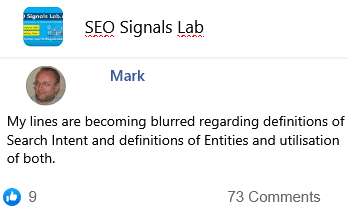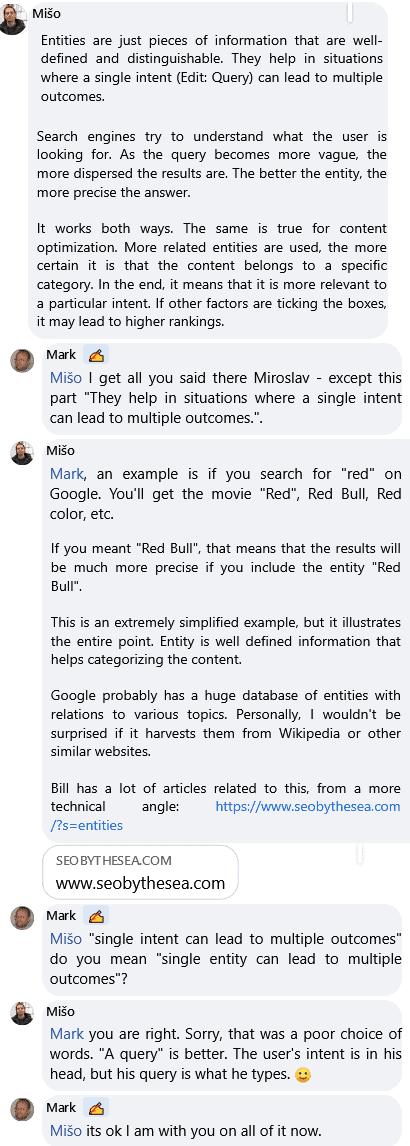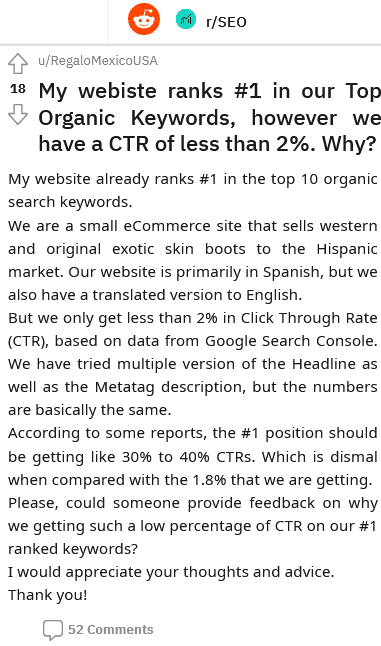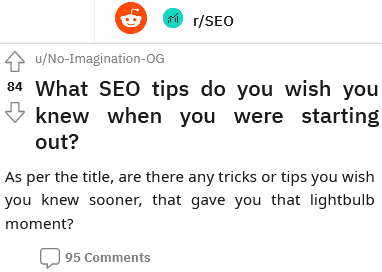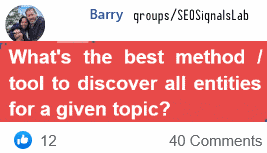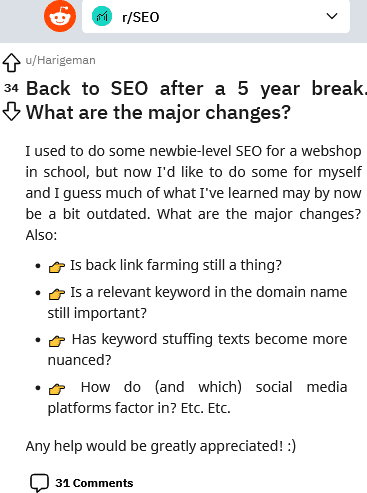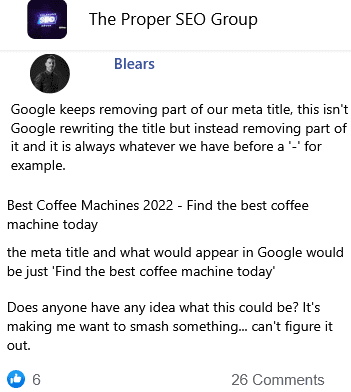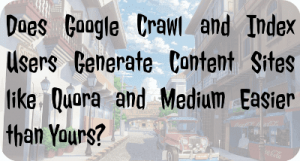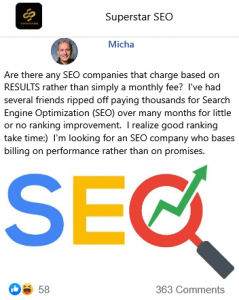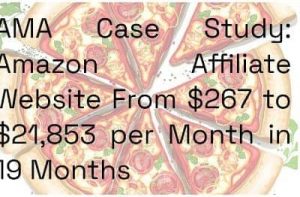My lines are becoming blurred regarding definitions of Search Intent and definitions of Entities and utilisation of both.
9 👍🏽9
73 💬🗨
📰👈
Entities are just pieces of information that are well-defined and distinguishable. They help in situations where a single intent (Edit: Query) can lead to multiple outcomes.
Search engines try to understand what the user is looking for. As the query becomes more vague, the more dispersed the results are. The better the entity, the more precise the answer.
It works both ways. The same is true for content optimization. More related entities are used, the more certain it is that the content belongs to a specific category. In the end, it means that it is more relevant to a particular intent. If other factors are ticking the boxes, it may lead to higher rankings.
I get all you said there Miroslav – except this part "They help in situations where a single intent can lead to multiple outcomes.".
Mišo » Mark
An example is if you search for "red" on Google. You'll get the movie "Red", Red Bull, Red color, etc.
If you meant "Red Bull", that means that the results will be much more precise if you include the entity "Red Bull".
This is an extremely simplified example, but it illustrates the entire point. Entity is well defined information that helps categorizing the content.
Google probably has a huge database of entities with relations to various topics. Personally, I wouldn't be surprised if it harvests them from Wikipedia or other similar websites.
Bill has a lot of articles related to this, from a more technical angle:
https://www.seobythesea.com/?s=entitiesSEOBYTHESEA.COMwww.seobythesea.com
Mark ✍️ » Mišo
"single intent can lead to multiple outcomes" do you mean "single entity can lead to multiple outcomes"?
Mišo » Mark
You are right. Sorry, that was a poor choice of words. "A query" is better. The user's intent is in his head, but his query is what he types. 🙂
Mark ✍️ » Mišo
Its ok I am with you on all of it now.
📰👈
Truslow 🎓
Entities are the things people can want. Search intent is those wants.
If I search for "printer" my search intent is most likely that I'm looking to either buy or learn about different types of printers. As such, Google is likely to show me a mix a both.
If I search for "printing", it's more likely that I'm looking for a service – I want someone to do my printing for me. So Google is likely to favor printing service related sites over ones that sell or make printers. It may still toss a few in to cover the bases, but the mix would most likely strongly favor the service.
Now… we know the intent of those terms now – in broad strokes anyway. What are the entities you have? Are you a printer offering a "Printing Service" or do you sell "Printers"? Those are the entities.
Stockbridge – yep – I am with it, and in your example, we can see that an entity of "printing service" also provides the actual intent of the phrase.
Do you know of any software which is an actual entity extractor? I read that the Google Natural Language Processing (NLP)Application Programming Interface (API) is only giving around 15% of them. I need all of them.
(don't we all lol)
Truslow 🎓
No… AKAIK it doesn't exist. Google's API is the only one that actually uses Google's knowledge graph. Any other entity tool has to have their own graph – which doesn't really reflect Google's at all. It might match up – or it might not.
One fun tool – though it only works for People and Brands – is Kalicube. On the free version there, you can put in a brand or person's name and it'll actually pull out the unique entity ID for you. It can also give you some insight as to things that are the same but that are being treated separately or things that are separate but that are being treated as the same thing.
https://kalicube.pro/knowledge-graph-explorerI use that a lot when I'm trying to establish a brand or clean up a sloppy one (you know, clients with Name, Address & Phone Number (NAP) issues and things like that). Check that every few weeks and you can see how the entities evolve, merge, and reshape. Plus the link directly to the search results for the unique entity let's you know EXACTLY what Google is currently doing with it at the moment – regardless of any search term you might put in to call it up.
Are you in #Google #knowledgegraph? Here's a great tool that will tell you! @jasonmbarnard
KALICUBE.PROAre you in #Google #knowledgegraph? Here's a great tool that will tell you! @jasonmbarnard
Mark ✍️
In "theory" the entities could be scraped from sites listed in the Search Engine Result Page (SERP) right? But yes – I can see huge problems there which makes my thinking a very loose theory.
Truslow 🎓
Scraping wouldn't work. Different locations assume different things… When I personally search for your name, for example, I get a #1 listing of a banker, but get the soccer player's panel as a suggested "See Results about…" so that's the entity. But if you go to Kalicube (which uses the Application Programming Interface (API)) I get the soccer player, the magician, and then also calls Wikipedia's disambiguation page. So… a scrape from here would be different from a scrape where the magician is more famous or where it's so obscure either way that the disambiguation page might show. All THREE are unique entities – at least right now.
Mark ✍️ » Truslow
I would issue the search for the Search Engine Result Page (SERP) to scrape from my target ranking location. That would help. Thus if I knew my site was targeting the US, I would issue the search from there – getting more granular than country would probably cause problems. Yes – scraping is messy and as I say – very loose theory indeed.
"Any other entity tool has to have their own graph – which doesn't really reflect Google's at all. It might match up – or it might not." – This is very interesting to me. Lots of people are claiming (and I do not doubt them) success using entities – and YET – there is no tool to provide them? I am 100% confused by this. My only assumption is that "other tools" ARE a good match and DO reflect googles graph. (overall – all graphs should be close – in a perfectly programmed world – all graphs with equal crawl resource would actually be identical!)
So which tool are people using to establish their entities when constructing their content layout do you think? Thus as they build their silos – which tools are giving them the topics which contain the entities they should discuss?
Truslow 🎓
I use the tools to some extent. But even if they are tapping into Google – they only have access to the API – which you are saying only has about 15% of. Any other tool is guessing, true – but it doesn't make it not useful. If this tool that got developed for a quarter million or less can figure out this list of entities, you might assume that Google has done so too. Google has spent billions on it.
BUT… entities by themselves are useless – and all the tools simply report the entities. An entity only means something by what it's connected to via its attributes.
"Ford Motor Company" is an entity but it doesn't mean anything. It starts to mean something once you say that they "Manufacture Automobiles" and Trucks. And then it needs to know where the plants are. And then what types of autos and trucks are made. And maybe some historical data points, and so on. Then Ford Motor Company starts to mean something.
For tools the best at this that I've found is InLinks – but that really only works on a local level using your site (and a few external connections here and there, but nothing complete, by any means). It is great for showing how the links on your site connect the ideas and form its own knowledge graph of what you are saying about your brand, products/services, and everything else. But it doesn't scale out to everything.
For that, the only thing I know of is to sit down and start putting the words you got from these tools and keyword planners and start looking at the results. Watch the rich listings. See the classification of sites Google is tending to show in the organic results to help determine intent. See where Google guides you – does it ask you to disambiguate (did you mean…?) or does it ask you to drill down (Plumbing – see results about Household Plumbing, Commercial Plumbing, or Industrial Plumbing). Look for sameness and differences in variations – one of my clients makes hydraulic couplers AKA hydraulic fittings. And while the terms can be used interchangeably, Google has some very different ideas about each one (which is one of my projects to "fix" this year).
Google itself – using it, searching, and KNOWING your terms and seeing how they connect is really the only way to do it. I can't imagine we'll have tools for that for quite some time yet. At this point, I can't even imagine how one might program a tool that could scale and work for everything. I could possibly write something that would cover a niche fairly well – after a while of hitting, but the landscape changes so fast it wouldn't be that useful.
Remember too – it's not always about finding what's that – but it's about connecting yourself to what is there. And then when that happens, the very shape and nature of what is there changes – sometimes drastically.
📰👈
Kristine
Entitles are definitions and generally nouns.
Intent is your desire to know something about one of these nouns in relation to other nouns under a topical mesh.
I thought intent was what I want to do with my noun? Buy it – read about it – or find direction to it. How do you mean "Intent is your desire to know something about one of these nouns in relation to other nouns under a topical mesh." – could you expand on that part for me?
Kristine » Mark
Sure if I go to the grocery store the fruit section will Mlmark bananas as bananas that's your entity … when I'm at the fruit section do I want to buy the bananas? What do I want to buy the bananas for? Do I want to make something with them? Do I want them in my cereal? That's intent.
Mark ✍️ » Kristine
When I talk about intent – I generally mean that my content must match what search engine x has decided the intent to be for a given query.
Thus, a search for "hairstyles" brings up a load of sites all going on about "the best 10 blah blah hairstyles" or "the top 20 hairstyles for 2022".
Therefore – if I want to rank for the term "hairstyles" – I am far far far better off writing a web page which matches the requirement for an "informational" query – as informational appears strongly (almost certainly) what the intent classification for "hairstyles" is.
So I now do my "hub" page – which I want to rank for "hairstyles" – and I do it in the manner dictated by the SERP – an informational page – probably structured around "hey heres the best top 17 hairstyles for the modern age" etc etc.
As I understand it – I now have to write x pages in a silo beneath that page, each of which covers an entity about "hairstyles".?
Kathy » Mark
Yes but I think this is a little backwards unless you're just trying to get as much traffic as you can. I don't let Google decide my intent. I do that. Are you targeting customers who are intent on finding a hairstylist or a hairstyle? Those in group A may eventually make it to ground B, but you need to match their original intent first. If you find Google is only showing hairstyles for that query and that's not who you want, don't feed that beast unless you're willing to spend the time and money to nurture
MOFU.Marty Marion 🎓
Hmmm, so I am a little late to this party, but I am also going to be the spoiler on the topic of intent. Frankly, I think all discussion of intent that is based on the distinction of "information vs transaction vs direction" is a superficial approach, and it has only minimal value for serious SEO
Here's an example:
Joe wants to buy a Rolex watch. OK, we all agree that is a transactional intent. But what we do NOT know is WHY Joe wants to buy a Rolex.
Does he want it for himself because he wants what he believes is the association of success, or the appearance of a higher social status?
Does he want it as a reward for his hard work and getting promoted to be Chief Executive Officer (CEO) of a publicly traded company?
Does he want to get a mind-blowing gift for his life-long best friend who's getting married in two weeks?
Does he want it as a graduation present for his son who just graduated med school?
The INTENT BEHIND THE INTENT is the secret sauce for serious SEO powering of content and technical signals.
Google the following phrases:
best rolex for wedding present
best rolex for graduation gift
See what comes up in position 1. You're welcome.
Ok thinking…
Yourself and Kristine have just brought this up in different ways, although similar.
I think initially, the basic intent categories (of which I am certain there are many) must be identified.
This is "me" deciding that "a search engine" has classified a "search query" as having an "intent" of type "X".
The initial "information vs transaction vs direction" is important for the content creator, because ONLY once we know the intent category (which a search engine has assigned in the background) for relatively ambiguous search phrases, can we begin to write copy which aligns with the background intent.
When we become less ambiguous – such as in your examples – the intent within the intent is DEFINED IN THE QUERY.
Am I on the right lines here?
Marty Marion 🎓 » Mark
I see where you are going with this, and I don't ENTIRELY agree or disagree.
Every different category, product, service etc, is likely to have multiple DIFFERENT "intents behind the intent", depending on the specifics of that category, product, etc.
In the Rolex example I gave, the path would be to research the top reasons people buy Rolexs and then create properly SEO'd assets for each one… think "mini silos", and also "silos within silos".
"Gifts" could include (examples only) for yourself, for business purposes, for social purposes, for special events…
"Investment" could be another intent behind the transactional intent.
Just understanding that a specific search query is likely to be to "gain information" as opposed to "find a place to buy something" isn't enough.
Many SEO users like to go deep in narrow content buckets; I prefer to go wide and cover more longer-tail bases, then adjust or augment as metrics start to come in. Neither way is "more right" than the other; it's just what has worked for me, and my clients are almost exclusively enterprise ecom so there are typically a lot of potential directions to go in. But I don't see why that approach would not work for virtually any subject.
Mark ✍️ » Marty Marion
As usual I am going round in circles unable to decide where to start.
Kristine
You are on the right path Mark and so is Marty Marion that is why on an ecommerce site it is good to have transactional and informational intent content for the same query if that matches. Like I am buying a sleeping bag… but I want to also know how to buy a sleeping bag – two intents.
Marty Marion 🎓 » Kristine
My point was that you need to take it EVEN FURTHER… not only do you want to know "what to look for when you buy a sleeping bag" (which is one of the most likely questions), but you need to know the "intent behind the intent" and address it…
Do you want to buy a sleeping bag for your own use, or for a child? Or as a gift? Or for going away to camp? Or a two-person sleeping bag? Or a waterproof sleeping bag? Or a sleeping bag for extraordinarily cold weather? Etc etc etc.
GO WIDE before you go deep. That's the whole point.
Kristine » Marty Marion
Yes I was agreeing 🙂
Ammon Johns 🎓
Entities allow you to differentiate between what sports equipment are vaulting horses, which are cricket bats, which are footballs, etc. In fact Entities can help the search engine differentiate between a tennis ball, a football, a basketball, a medicine ball, and so forth.
Search intent is what someone wants to do. This sometimes is at odds with entities, since someone may kick around a tennis ball, or shoot hoops with a soccer ball.
What an Estate Agent is, or a Plumber, is an entity. Now there are more specific entities for each specific plumber or each specific estate agent, but you get the idea. The entity is the thing itself, and attributes can be attached to the entity (location for example).
But someone searching for "Plumbers in Central London" isn't asking what a Plumber is, or even asking for a specific plumber, but rather has the intent of finding a listing of several plumbers in the selected area (Central London).
The fact they said "plumbers" rather than the singular "plumber" may be a sign of intent – it suggests they want to compare and contrast several options perhaps.
But where it gets really fun is when they are not someone wanting to *hire* a plumber, but are a sales rep for a plumbing supplier company looking for companies to approach in their area.
That bit, the what someone has in mind, what they are trying to achieve eventually from doing the search, is Search Intent.
💟👍🏽6
I am 100% with you – cheers.
🤔
📰👈
Can a Popular Search Engine Distinguish the Intent of a Searcher, For Instance, Tutorial, Product Page
Recommended Number of Words for an Article to Beat the Competition in Search Engine Result Pages SERPs
Used Python to Analyze Search Engine Result Pages SERPs
Num of My Visitor is so lower than the Search Volume a month. Why?
The Most Important Tool in Search Engine Optimization (SEO)
Tips to Improve Organic CTRs (Click Through Rates)
They said that a High Bounce Rate is Not Always Bad
An SEO Case Study on My Reverse Content Post Clustering
